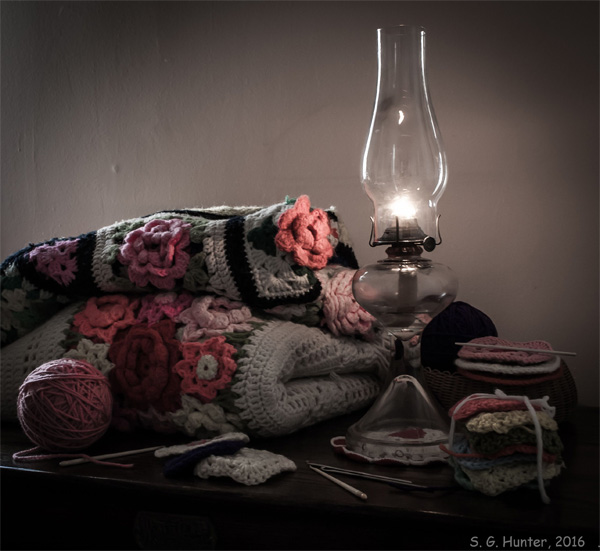This guest post is by Jill Crainshaw.

“Love’s Remains” by Sheila Hunter, used by permission.
While searching a closet for Christmas decorations the other day, I pulled out a dusty wooden box, the shipping crate kind that has a lid. I had forgotten all about having that box, and as I coaxed it from its hiding place, I realized that I couldn’t even remember what was in it. When I lifted the lid, the ghosts of lifetimes past slipped out to hover over my shoulder as I explored the contents.
My grandma was a crochet wizard. During long winter nights, she sat in her blue recliner, her lap and feet getting cozier by the hour as her nimble fingers grew yet another “mile a minute” afghan. The box I pulled out of the closet held peculiar odds and ends of Grandma’s handiwork. A coaster half-finished. Bits and pieces of squares for a granny throw. A clear plastic bag stuffed with a rainbow of left-over yarn ends from projects long since completed.
My fingers lingered in the rows of each unfinished piece. For which niece or grandchild had she been wizarding this one? What design yet to be revealed had she been stitching?
I am the only person in our family other than Grandma who crochets. Grandma taught me when I was six years old. I guess that is why I inherited the box when she died. “If anyone will know what to do with all of these leftovers,” my mother said, “you will know.”
I’m not sure I do know what to do. Not with these forgotten but now found fragments and not with the fragments of things that seem to be slipping through people’s fingers during this 2016 Advent season. So many justice-making ideas, plans, and dreams—started but not yet finished. What courage can we inaugurate in 2017 that will propel us to complete some of the important projects we have started as communities, a nation, and a world?
Words from Isaiah 35 call to us on this Third Sunday in Advent:
The wilderness and the dry land shall be glad,
the desert shall rejoice and blossom;
like the crocus it shall blossom abundantly,
and rejoice with joy and singing.
The Latin term for this week in the season of Advent is “Gaudete” or “Rejoice,” and on this Sunday many churches follow the historic practice of lighting a rose-hued candle of joy instead of the penitential purple or anticipatory blue candles of the other three Sundays.
I had been thinking over the last week that perhaps this Advent we should forego Rejoice Sunday. The world is too weary with violence and pain. Too many hard things are happening around the globe and in the lives of people we love. Too many fleeting incarnations of justice. Too many episodic glimpses of the big-as-sky-and fields vision of God’s peace and abundance for all people.
But then I opened that box in the closet, a box full of beginnings of things my grandmother imagined along with the plastic-bag preserved ends of other things she had finished and given away. And I heard a whisper, or I thought I did: “You can create something from this.”
Perhaps that is what Rejoice Sunday can inaugurate for us in seasons of uncertainty. In the face of fickle and fear-hawking powers that be, perhaps we can pick up the threads of God’s whispering revolution that was birthed in Bethlehem and that has spun out from there across the centuries in colors and textures both subtle and bold. Perhaps that is what incarnation is—not a one-time Bethlehem nativity scene but each time since then when someone has heard the quiet murmur—“You can create something from this”—and believed that in community with others and stirred up by God’s Spirit we can. We can be love and kindness in the face of despair, and when we are, God’s hope is inaugurated. We can refuse to measure worth by the standards of empire, and when we do, God’s grace is inaugurated. We can join hands with our sisters and brothers on the frontlines of resistance to evil and injustice in any form, and when we do God’s love is inaugurated.
And when God’s hope, grace, and love are inaugurated through courage and kindnesses that spread out across a winter-wilderness land with the colors and warmth of a mile-a-minute afghan—when God’s hope, grace, and love spread out over our earth even across the years from Bethlehem to countless other times and places where faith in the face of doubt has birthed redemption to Grandma’s recliner to this present moment—then perhaps we will be able to see it: Crocus blossoms in desert places.
Even better, we can do our part to coax those life-giving colors up out of hard-ground places.
“Strengthen weak hands,” the ancient writer pens as this text from Isaiah flows on.
“You can create something from this.”
We can, by God’s grace. And when we do, just maybe wildernesses will rejoice with joy and singing.
 About Jill Crainshaw
About Jill Crainshaw
Jill Crainshaw is a PCUSA minister and Blackburn Professor of Worship and Liturgical Theology at Wake Forest University School of Divinity. She is the author of several books on worship and ministry.
Leave a Reply